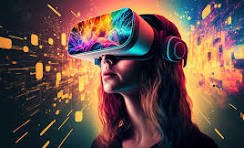Navigating Marketing Trends 2025: How AI and VR Are Revolutionizing Brand Engagement
As we stand on the cusp of a new era in marketing, 2025 promises to be a year of profound evolution driven by technological advances and shifting consumer expectations. With the integration of AI and virtual reality, brand engagement is set to become more immersive and personalized than ever before, transforming the way businesses connect with their audiences. This post will explore the pivotal marketing trends of 2025, including AI-driven analytics, augmented reality brand engagement, and the growing emphasis on sustainability and ethics in advertising. By understanding these trends, business owners and marketing professionals can position themselves as industry leaders, ready to leverage new digital marketing strategies and adapt to changes in consumer behavior. Join us on this journey to navigate the future of marketing and discover how to harness these innovations for success.
AI Transforming Marketing Strategies
Personalized Consumer Experiences
AI in marketing is revolutionizing how businesses understand and engage with their customers by offering personalized consumer experiences. By analyzing vast amounts of data, AI helps brands predict consumer behavior and preferences. This allows for the creation of tailored marketing strategies that resonate with individual needs and desires. For instance, AI-driven analytics can segment audiences more effectively, ensuring that the right message reaches the right person at the right time. This results in higher engagement rates and more meaningful connections between brands and consumers.
Furthermore, AI enables dynamic content personalization. For example, personalized product recommendations or customized email campaigns can significantly enhance the consumer experience, fostering loyalty and increasing conversion rates. As we move into 2025, it’s essential for businesses to harness AI’s potential to deliver these personalized experiences, as consumers increasingly expect brands to understand and cater to their unique preferences.
AI-Driven Analytics and Insights
AI-driven analytics are transforming the landscape of digital marketing strategies in 2025. By leveraging advanced algorithms, businesses can glean deeper insights into consumer behavior, enabling them to make data-driven decisions that enhance marketing efficiency. AI tools analyze customer interactions across various channels, providing a comprehensive view of consumer preferences and emerging trends.
With these insights, marketers can optimize their campaigns for better targeting and personalization, leading to improved customer engagement and higher conversion rates. For example, predictive analytics can forecast market shifts, allowing businesses to stay ahead of the competition by adapting their strategies proactively.
Additionally, AI-driven insights help in identifying new market opportunities and untapped customer segments, paving the way for innovative approaches to reach potential customers. As AI technology continues to evolve, its role in shaping effective marketing strategies will only grow, making it an indispensable tool for businesses aiming to succeed in the increasingly competitive digital marketplace.
Immersive Brand Engagement with VR
Virtual Reality Marketing Innovations
Virtual reality marketing is rapidly advancing, offering businesses innovative ways to engage consumers in 2025. By creating immersive environments, VR allows brands to offer experiences that transcend traditional marketing boundaries, making interactions more memorable and impactful. For instance, virtual showrooms let customers explore products in a 3D space, providing a more interactive and engaging experience than standard online browsing.
Brands can also leverage VR to craft compelling narratives that place consumers at the center of a story, enhancing emotional connection and brand loyalty. Virtual events and product launches are becoming more prevalent, allowing global audiences to participate in real-time, fostering a sense of community and inclusivity.
Moreover, VR marketing innovations enable brands to collect valuable data on consumer behavior, refining their strategies to better meet audience needs. As VR technology continues to evolve, its potential to revolutionize brand engagement grows, offering marketers a powerful tool to captivate and retain their target audience.

Augmented Reality in Brand Storytelling
Augmented reality (AR) is reshaping brand storytelling by blending the digital and physical worlds to create interactive experiences. In 2025, AR is integral for brands aiming to engage consumers in innovative ways. By overlaying digital content onto real-world environments, AR enriches storytelling, making it more engaging and memorable.
For example, brands can use AR apps to bring print advertisements to life, transforming static images into dynamic, interactive experiences. This not only captures attention but also deepens consumer interaction with the brand’s narrative. AR can also be used to enhance product packaging, offering consumers a unique way to explore product features and stories.
Moreover, AR experiences are easily shareable on social media, amplifying brand reach and engagement. By integrating AR into their storytelling strategies, brands can offer personalized and immersive experiences that resonate with consumers, strengthening brand loyalty and setting themselves apart in a competitive market.

Embracing Sustainability and Ethics
Sustainability in Marketing Approaches
In 2025, sustainability in marketing is more than a trend; it’s a necessity. Consumers are increasingly motivated by environmental consciousness, and brands must align their marketing strategies with sustainable practices to remain relevant. This involves not only promoting eco-friendly products but also embedding sustainability into every facet of a brand’s operations and messaging.
For example, companies are adopting sustainable packaging solutions and optimizing supply chains to reduce their carbon footprint. Additionally, digital marketing strategies are being designed to minimize environmental impact, such as reducing energy consumption in digital ads and promoting virtual events over physical ones.
Furthermore, transparent communication about sustainability efforts builds trust and strengthens consumer relationships. Brands that genuinely commit to sustainability can differentiate themselves and foster loyalty among eco-conscious consumers. As the emphasis on sustainability grows, businesses must innovate and adapt their marketing approaches to meet these evolving expectations, ensuring long-term success and positive brand perception in the marketplace.
Ethics in Advertising Practices
Ethics in advertising is a crucial focus for brands in 2025, as consumers demand greater transparency and integrity in marketing practices. This shift is driven by a growing awareness of social issues and an expectation for brands to act responsibly. Ethical advertising involves avoiding deceptive practices, respecting consumer privacy, and promoting truthful messaging.
Brands are increasingly scrutinized for how they portray diversity and inclusion in their campaigns. Authentic representation and sensitivity to cultural differences are essential to building trust and credibility. Additionally, safeguarding consumer data and ensuring consent for data use are paramount in maintaining ethical standards.
Moreover, ethical advertising practices contribute to a brand’s reputation and customer loyalty. Consumers are more likely to support companies that align with their values and demonstrate social responsibility. As businesses navigate the complexities of modern marketing, prioritizing ethics not only meets consumer expectations but also fosters long-term relationships and sustainable success in a competitive landscape.




